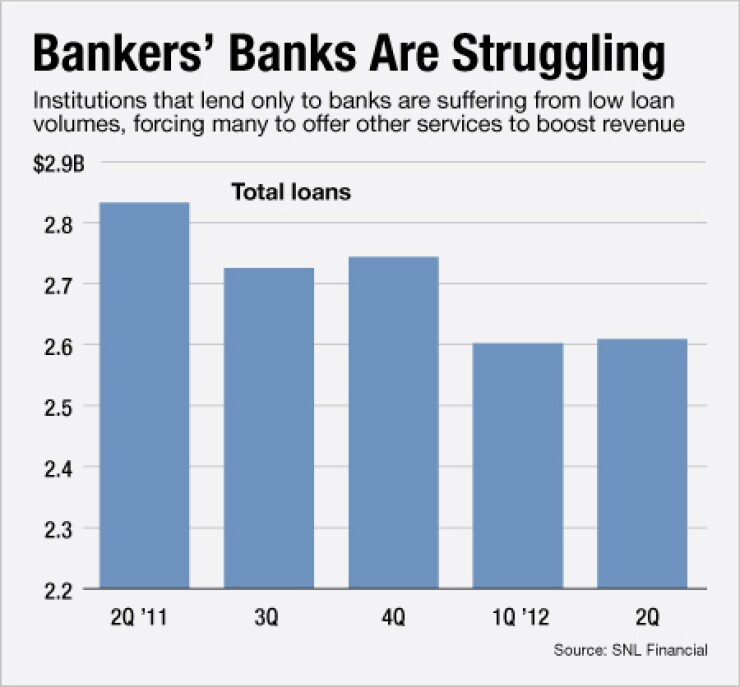-
Starved for growth, several community banks are putting aside distrust from the financial crisis to seek out partners for bigger commercial loans.
March 14 -
The FDIC charged executives of the failed Silverton Bank with squandering millions on planes, posh digs, and island retreats.
August 23 -
Executives at a number of smaller banks see an opportunity in lending to peers despite lingering risks that are driving large and midsize lenders out of the business.
September 10

Bankers' banks are evolving into trusted advisors to small banks just a few years after a pair of high-profile failures pared their ranks and damaged the group's credibility.
Fifteen chartered bankers' banks service thousands of small banks, with most holding deposits or loan participations. Weak demand and a heightened regulatory environment have led many of those banks to expand into consultant work that includes reviewing loan portfolios and assessing business strategies. And one is running a hotline to answer client's compliance questions.
"For most banks to be successful, you can only hunker down so much," says Joseph Quinlan 3rd, the president and chief executive of First National Bankers Bank in Baton Rouge, La.
"I take the Marine Corps approach," Quinlan says. "When the bullets are flying, that's when you fill the magazine. That's where we are at right now. Everybody's having to come up with a new backup plan, a new strategy."
The $868 million-asset bank had historically handled some loan reviews and compliance work in the past. But it is in the process of rolling out a new software platform to handle broader loan book assessments.
Bankers' banks have come a long way since their reputations were tarnished by two 2009 failures:
"Bankers' banks certainly have some issues they've had to deal with," says Mike Wasson, the president and chief executive of Midwest Independent Bank in Jefferson City, Mo. "We're now getting to the point where we've got those [issues] behind us."
Bankers' banks, like other lenders, are struggling to grow loans and reduce bad credits. Total loans at bankers' banks edged up 0.2% in the second quarter from March 31, to $2.6 billion, according SNL Financial. Still, loans were down from the $2.8 billion reported a year earlier.
"Everybody is having to get creative," says Quinlan, whose bank serves more than 600 banks. "At least half of the bankers' banks have delved into [consulting] in one form or another."
Pacific Coast Bankers' Bank in Walnut Creek, Calif., is helping clients restructure their business models to improve earnings and business demand. The bank, which serves about 500 clients, offers a product to help banks issue long-term, fixed-rate loans that transfer as floating-rate loans on the lender's book.
"We have risk consulting services that we have continued to modify" to include "credit stressing opportunities and asset-liability management," adds Steve Brown, Pacific Coast's president and chief executive. "Our approach is to help banks continue to get the kinds of loans they want and in markets that they want."
Competition has also increased as more consultants set up shop. Executives at bankers' banks contend that there is ample demand as many banks struggle with regulation and a difficult economy.
"While there are more providers out there, there are also more banks needing those services than they ever have before," Quinlan says. "People are still reeling from the Dodd-Frank Act, and regulatory guidance has kept folks … very, very busy."
Wasson says the regulatory climate and reduced staffing at small banks created a "huge increase" in his bank's information technology work and loan reviews and audits at other banks.
"I don't know whether we have an upper-hand" against other consultants "but we've got good, solid relationships with a lot of banks," says Wasson, whose bank serve more than 600 clients.
Some community bankers say the challenges that bankers' banks faced during the financial crisis actually makes them more qualified to serve as consultants.
"They've had struggles, but everyone on their team gets banking," says Eddy Arriola, the chairman of Apollo Bank in Miami, a former Silverton client. "They've walked in our shoes and there's relevant experience."
Arriola, who would consider hiring a bankers' bank as an advisor, says he would not invest in one as a new shareholder. "We just haven't found it enticing [as a] long-term investment. If that's the case, we'd rather invest in ourselves," he says.
Bankers' banks are also expanding their services because of concerns that future consolidation will eventually reduce the number of small banks that give bankers' banks business.
"We get nominal profitability out of [consulting], but no bankers' bank hangs their hat on one service," Quinlan says. "We really do it because the bankers' bank model was created to ensure the viability and ongoing success of community banks."





